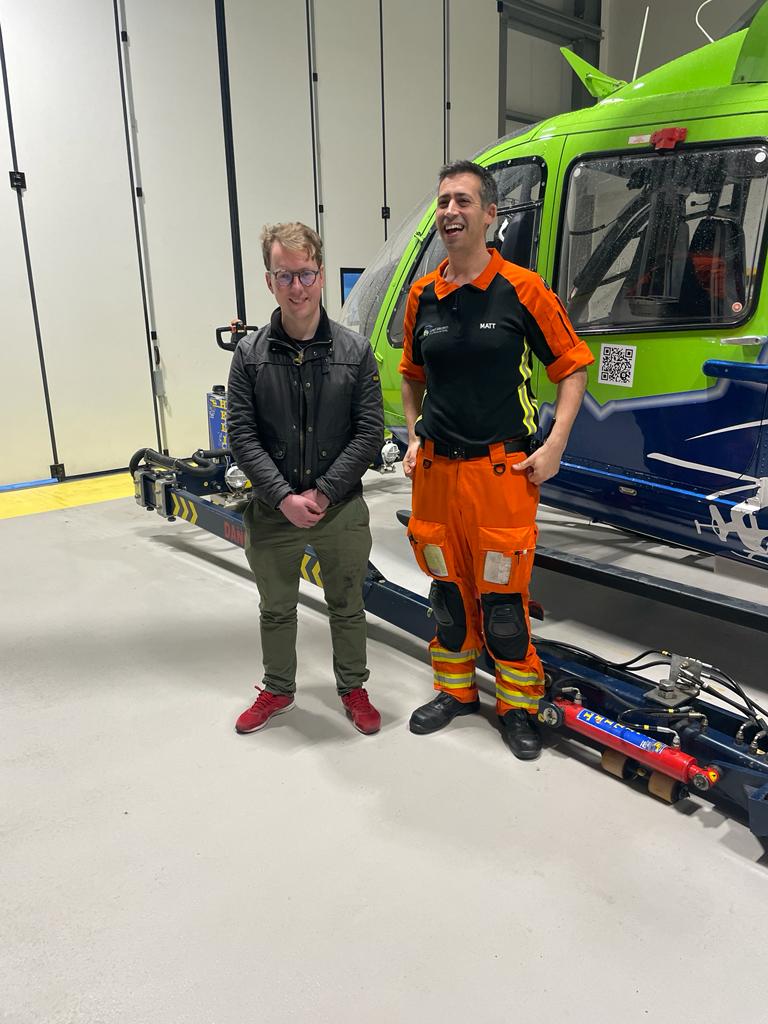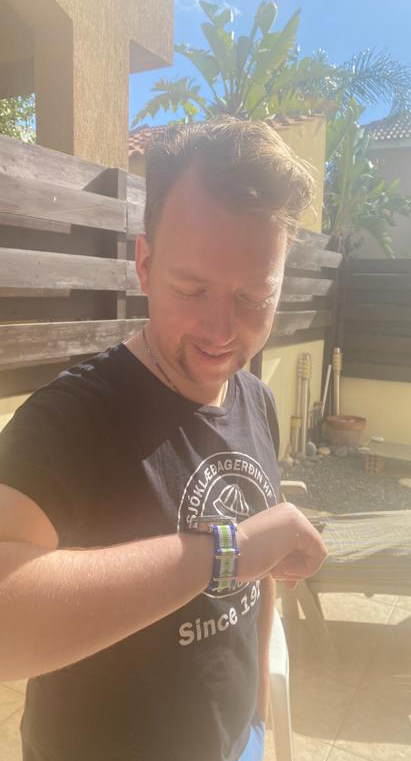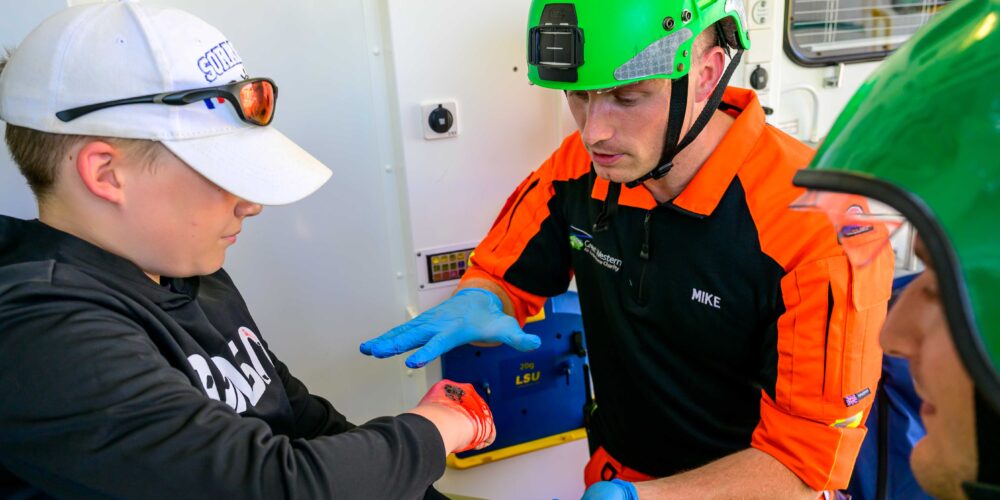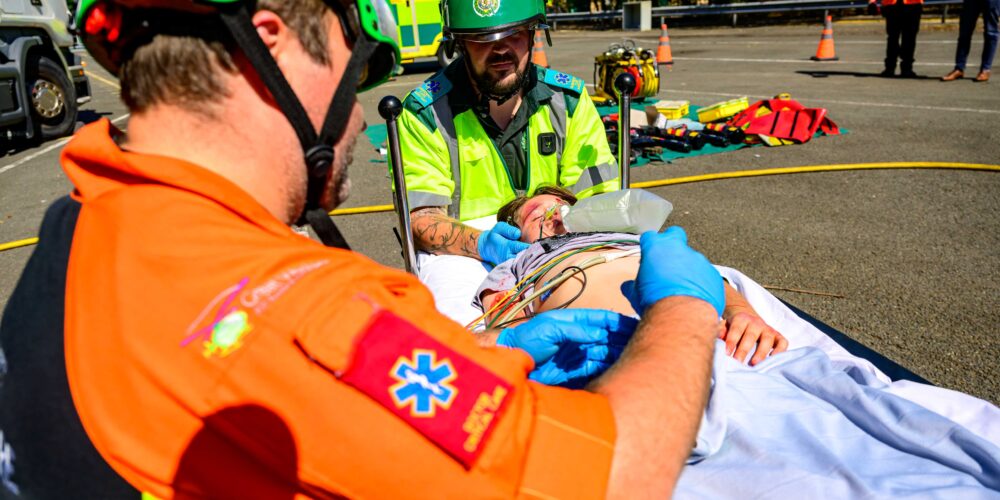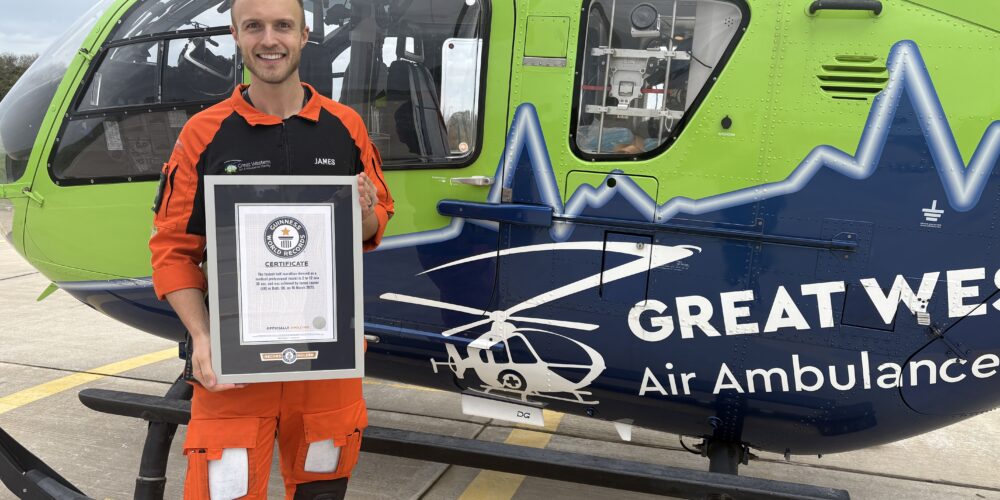
Great Western Air Ambulance Charity celebrates outstanding achievement at the Air Ambulances UK 2023 Awards of Excellence
December 4, 2023
Doubling the number of our high street shops to save more lives
December 6, 2023Joshua Beavers didn’t know he had a rare brain disease until he woke up in hospital after suffering a severe brain haemorrhage at his local gym. At the age of 34, Josh had to relearn how to do things that most of us take for granted; how to sit up and walk. But it was thanks to the quick actions of those around him at the time of his haemorrhage, that he was given another chance at life. Things could have been very different for Josh.
“I was like a walking time bomb”
On 9 May 2021, Josh collapsed at his local gym in Clifton, Bristol. He made it to the hospital thanks to the actions of the gym staff, two off-duty doctors who happened to be there, an ambulance crew, and the specialist skills of Great Western Air Ambulance Charity’s (GWAAC) Critical Care Team.
Josh had been living through the COVID-19 pandemic like the rest of us. He was a lawyer working from home. His last memory of the day that he collapsed was texting his cricket captain to say he couldn’t play that afternoon because his Achilles heel was playing up; he decided to pop to the gym for a quick workout and a shower instead.
Josh can’t remember going to the gym but he has learned since that while there, he went to reception to say he had a headache and didn’t feel well. He was given a sports drink and soon after fell unconscious. The two off-duty consultant doctors came to Josh’s aid and called 999.
An ambulance crew arrived and called for the support of GWAAC’s Critical Care Team; they arrived within minutes. Josh only knew about GWAAC because he saw his hospital discharge notes that said our crew had attended. To thank the GWAAC team and to learn more about what they did, Josh asked to visit the airbase when he was recovered. It was during that visit that Specialist Paramedic in Critical Care (SPCC) Matt Robinson was able to fill in the gaps for Josh and his mum Ruth.
Treating Josh at the scene
SPCC Matt remembers getting the call and rushing to the scene with Critical Care Doctor Glyn Thomas in the GWAAC response vehicle. Upon arrival, they grabbed the kit bags and raced up to the second floor to find Josh being managed on his side by the ambulance crew and the doctors.
Josh was unconscious, looking agitated and uncomfortable, and not speaking. SPCC Matt said, “It appeared to be a neurological event; his airway was compromised and there was a risk he would lose the ability to breathe for himself.” The priority, SPCC Matt said, was, “to secure his airway and rest his brain to minimise the impact of injury.” The crew anaesthetised and intubated Josh, prepared him for his journey to Southmead Hospital, and then travelled with him in the back of the ambulance so they could closely monitor him and continue his specialist care en route to the hospital.
Once at Southmead, Josh went straight to the CT scanner, bypassing the emergency department. He underwent an emergency operation, “to drain the blood that was filling up my brain; there was a bit of a race to drain it quicker than it was filling up.”
Seven days later, Josh woke up from a coma
On coming around from his coma, Josh was disorientated and lived in a strange dream-like world where he was convinced he was in a hotel rather than a hospital. He recalls how the nurses at Southmead had taken photographs of themselves with Josh and hung them up in his hospital room to jog his memory and try and make him understand what was happening.
Josh was diagnosed with Moyamoya disease which, according to The National Institute of Neurological Disorders and Stroke, is “a rare, progressive cerebrovascular disorder caused by blocked arteries at the base of the brain. Moyamoya means “puff of smoke” in Japanese and is used to describe the tangled appearance of tiny vessels compensating for the blockage.” Or, as Josh likes to describe it: “A rare disease that affects middle-aged Japanese women.”
Within a month Josh had a further operation and a graft on his brain which was performed by one of the top Neurosurgeons in the country. Josh said, “It gave the blood a new route to my brain by passing the artery that went pop.”
At the time, and still in his world of dreams, Josh thought he’d been waiting years and years for his surgery. He said, “I had the feeling that I was never going to get out of those dreams; it was scary and surreal.”
Living with Moyamoya disease
By the time Josh left the hospital six months later, he had lost a lot of lean body mass; his brother remembers seeing his “little legs” as he was wheeled out in a chair. It took another couple of months for him to finally realise that it hadn’t all been a dream and that he really did have Moyamoya disease.
Two years on, Josh is well-recovered and leading a normal life with a few adjustments. Aside from the emergency critical care he received at the scene and the ongoing care and support in hospital, it has been his positive outlook and sense of humour that has got him through a long road to recovery.
One adjustment has meant giving up competitive sports (Josh previously played for Axbridge Cricket Club) and accepting that he, “won’t get back to full fitness.” Another has been getting used to changes in his eyesight: “I’ve lost my peripheral vision to the left-hand side, meaning that any sort of sporting prowess that I thought I had, has been left behind.”
But with typical good spirits, Josh said, “But I’m alive and doing well and my friends have been extremely supportive, and I’ve even returned to work. All of which is extraordinary, considering I was told I would not make a full recovery and might not even walk again.”
Josh still lives with Moyamoya disease and requires routine angiograms and radioactive scans, but he acknowledges that these are small sacrifices to make for the ongoing continuation of his health and wellbeing.
Thanking the crew that helped save his life
In March 2023, Josh was able to visit our airbase and personally thank the crew for helping him when he needed it most.
Armed with red wine, truffles, and cake, Josh told SPCC Matt and the team, “I can’t thank you enough for what you did that day.” SPCC Matt said how very good it was to see Josh back on his feet, and he explained that the service GWAAC provides is one cog in a much bigger picture. Saving Josh was a team effort with the help of the gym staff, doctors, ambulance crew, and hospital staff. Josh agreed: “The speed at which everything happened from all the different points of care, is why I’m here today.”
At the end of his visit Josh told the crew that three weeks before his brain haemorrhage, he’d bought a GWAAC-branded watch strap because he was surprised to learn that his local air ambulance was a charity; he had no idea at the time that he’d be needing GWAAC himself.
“It appeared to be a neurological event; his airway was compromised and there was a risk he would lose the ability to breathe for himself.”
- Josh Beavers with SPCC Matt Robinson
- Josh recovering in hospital
“But I’m alive and doing well and my friends have been extremely supportive, and I’ve even returned to work. All of which is extraordinary, considering I was told I would not make a full recovery and might not even walk again.”
Help patients like Josh, by taking part in our lottery
Top weekly prize is £1,000 and tickets are just £1!

